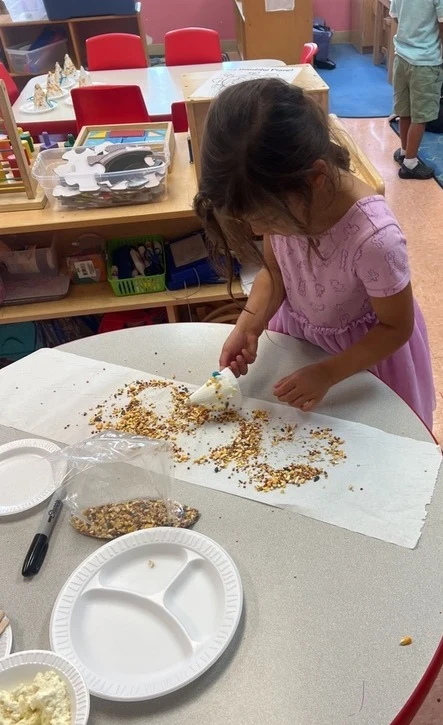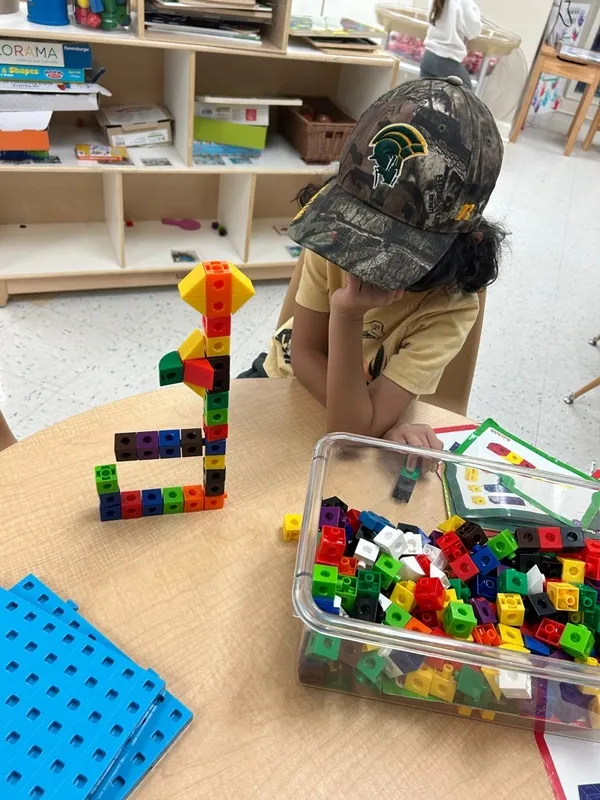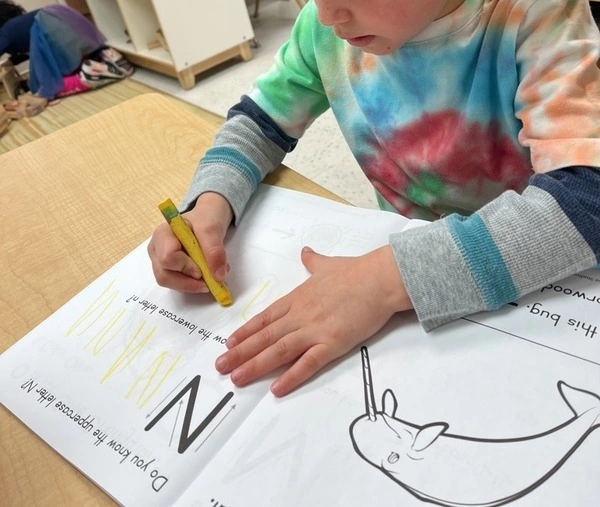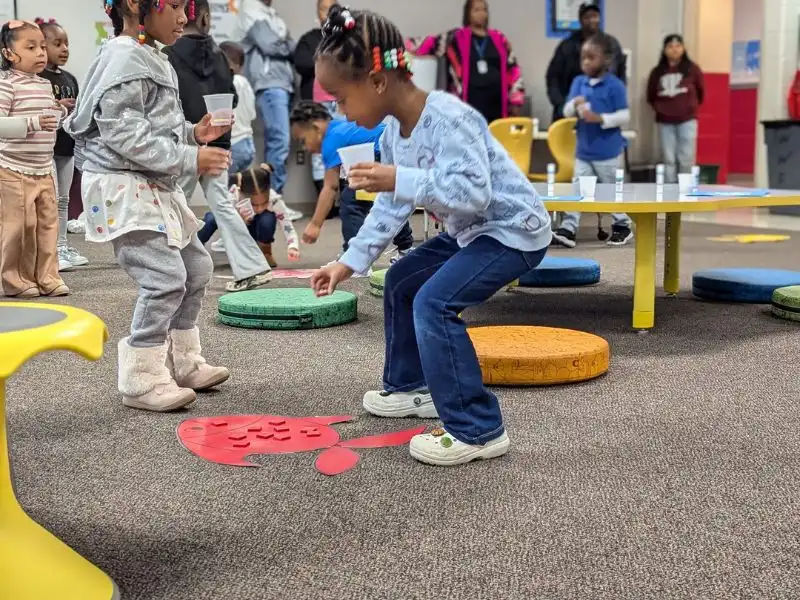Prevent the "Summer Slide" with these helpful tips!
From choosing what to wear to navigating tough conversations, adults rely on problem-solving skills every day—often without thinking twice. But these skills don’t just appear overnight. They’re built in early childhood through guidance, practice, and support.
At our 5-star Raleigh preschool, we know how important it is to help problem solving in early childhood. Join us as we share some practical ways to strengthen your preschooler’s problem-solving skills and support their social, emotional, and cognitive growth. Games, puzzles, and activities little ones already enjoy are the best way to enhance problem solving for preschoolers, 4 year olds, and toddlers alike.
Table of Contents

What is Problem Solving in Early Childhood?
Teaching kids problem solving in early childhood supports your toddler's ability to recognize a challenge, think through options, and choose an effective response. Problem solving skills for preschoolers are not only foundational for academic success but also vital for emotional regulation, social interactions, and independent thinking.
Children aged 3 to 5 are developmentally experiencing growth in the following areas:
- Cognitive
- Social
- Emotional
- Language
- Sensory
- Motor
Because this time for preschoolers is so substantial to their intellectual, emotional, and social development, the world around them can seem overwhelming, unfair, intimidating, and even confusing.
Research supports that developing strong problem solving skills for preschoolers can help reduce behavior issues, support school readiness, and build confidence in new situations.
How Problem-Solving Skills Fuel Development
Below are core problem-solving in child development examples to encourage children to develop this important skill of thinking critically.
Problem-Solving Activities for Preschoolers
Problem solving is an important skill that helps preschoolers navigate challenges, make decisions, and learn from everyday experiences. While many children begin developing these abilities at a young age, they benefit most when parents and teachers actively teach problem solving skills through practice and encouragement.

To help your child grow socially, emotionally, and cognitively, we've outlined some of our favorite activities that support problem solving for preschoolers. These real-life strategies make it easier to teach children how to solve problems with confidence, creativity, and critical thinking—both in the classroom and during everyday routines.
10 Effective Ways to Improve Problem-Solving Skills
#1 – Use Everyday Moments
Problem solving for preschoolers can be achieved by using everyday moments to demonstrate problem-solving techniques. In fact, this can be more helpful than reading a “how to” book or doing an assignment. Instead, using every day activities like going to the grocery store, driving in the car, making dinner at home, and cleaning the house to present your child with decisions related to problem-solving.
Here are a few small, daily moments to help children apply their problem solving skills in meaningful ways through everyday routines:
- Ask your child to put ingredients away in the pantry while you cook.
- Involve them at the grocery store by asking which aisle a certain item might be in.
- When there’s a mess of toys or supplies, encourage them to decide where items should go before starting a new activity.
#2 – Look to the Child for the Solution
Children won’t always have an adult nearby to guide them through every challenge. Giving kids the opportunity to think through and suggest their own solutions helps build confidence and encourages independence from a young age.
Here are ways children learn take the lead in solving their own problems:
- If a toy stops working, ask, “What do you think we could try to fix it?”
- When something doesn’t go their way, say, “What can we do differently next time?”
- Instead of offering an immediate fix, pause and ask, “What’s another way we could handle this?”
#3 – Solve Mathematical Problems
Problem solving for preschoolers can be achieved by incorporating mathematical skills. Mathematical thinking helps kids learn how to approach problems logically and systematically. Even at a young age, math activities can be a fun way to help toddlers achieve an understanding of complex problem solving techniques, including sequencing, comparison, and solution-based reasoning.
Here are simple ways to build problem-solving through math:
- Use building blocks to explore patterns, sizes, and symmetry.
- Play “Which one doesn’t belong?” using shapes or objects.
- Try age-appropriate word problems or counting games during playtime.
#4 – Ask Open-Ended Questions
Asking open-ended questions is a great way to encourage problem solving for preschoolers. This prompts children to think critically rather than give yes-or-no answers. This method helps them explore different possibilities and strengthens their decision-making process.
Use open-ended questions during everyday instances like these:
- “What do you think would happen if we tried it this way?”
- “How could we make this work better next time?”
- “What’s another way to solve this problem?”
#5 – Puzzles and Board Games
Games are one of the most effective ways to practice problem solving for preschoolers. Puzzles, board games, and logic toys allow children to work within boundaries while learning persistence and patience.
Try incorporating these activities at home or in the classroom:
- Offer jigsaw puzzles with a few missing pieces and let them figure out what’s missing.
- Play simple board games that require turn-taking and following rules.
- Try matching or sequencing games that encourage trial and error.
#6 – Read Books and Tell Stories
Books and stories help children explore how others solve problems, make decisions, and express feelings. They also spark imagination and empathy—key components of collaborative problem solving.
Use stories to encourage reflective thinking with activities like:
- Pause during a book and ask, “What would you do in this situation?”
- After reading, talk about how the character solved a problem and if there were other possible solutions.
- Invite your child to tell their own story with a beginning, middle, and a “problem” they solve.
#7 – Center Emotions
Learning to recognize and express emotions is essential for resolving conflict and overcoming frustration. By giving your child the words to describe how they feel, you help them respond calmly rather than act out.
Support emotional awareness and problem solving with these moments:
- When they’re upset, ask, “Can you tell me what made you feel that way?”
- Offer phrases like, “It’s okay to feel sad. What can help us feel better right now?”
- Encourage your child to use feeling words when explaining a problem with another child.
#8 – Model Problem-Solving Behaviors
Children often mirror the behavior of the adults around them. By calmly working through challenges in front of them, you’re showing how respectful communication, flexibility, and persistence lead to real solutions.
You can model problem-solving during moments like:
- Explaining why you’re returning an item to a store and how you’ll handle it.
- Letting your child hear you say, “That didn’t work—let’s try something else.”
- Narrating your thought process aloud, like “I’m figuring out how to fix this so it works better.”
#9 – Break Down Problems into Chunks
Big tasks can feel overwhelming to young children. Teaching them how to break things down into smaller, manageable parts gives them a sense of control and progress.
Practice this method using everyday responsibilities to encourage problem solving for preschoolers:
- Turn “clean your room” into steps: books first, then toys, then clothes.
- Break down getting dressed: pick a shirt, then pants, then socks.
- Create a visual chart showing each step of a daily routine.
#10 – Utilize Natural Curiosities and Interests
Children are naturally more engaged when learning involves their favorite topics or toys. You can use these interests as an entry point for teaching problem-solving techniques in creative, meaningful ways.
Encourage critical thinking by tapping into their passions:
- If your child loves animals, ask, “How do you think birds find food in the winter?”
- Use pretend play to act out a scenario with a challenge they need to solve.
- Turn a fascination with mail trucks, dinosaurs, or colors into a mini “research project” where they ask questions and find answers together with you.

Tips for Teaching Problem Solving Skills to Preschoolers
It is the responsibility of the adults who raise and teach children to provide kids with opportunities to strengthen their problem-solving skills in early childhood. If you are a parent, guardian, childcare provider, or early-childhood educator, it’s important to consider the best strategies for helping little ones adapt to the world around them and learn problem-solving skills.
Remember, it can be frustrating when things do not work out as expected for anyone at any age, particularly for preschool-aged children who are just learning to adapt to their surroundings.
Follow the 4 Key Problem Solving Steps for Preschoolers
When teaching your preschool-aged child how to problem solve, consider these four steps that are used in early-childhood classrooms:
- Identify the problem
- Brainstorm solutions to the problem
- Choose and implement one of the solutions
- Evaluate how that solution resolved the problem
These foundational problem solving steps support children in becoming more independent, resilient, and thoughtful as they grow.
Simple Ways to Support Problem Solving in Daily Life
While activities and real-life examples are essential, creating the right environment helps many children thrive.
Here are more ways to encourage problem solving in children during daily life:

- Create space for mistakes: Let them try solutions that may not work—this builds resilience.
- Praise the process, not just the outcome: Say things like, “I like how you kept trying different ways to solve that.”
- Offer limited choices: This supports decision-making without overwhelming them.
- Encourage collaboration: Working with siblings or peers helps children practice negotiation and cooperation.
- Be patient: Solving problems takes time, especially for preschoolers learning how to express themselves clearly.
With support and encouragement, even everyday situations can become valuable opportunities to practice problem solving skills in meaningful, age-appropriate ways.
Learn More About Our Raleigh Preschool Programs
At Primary Beginnings, we believe that strong problem-solving skills start early—and grow best in a nurturing, play-based learning environment. Our early learning programs in Raleigh are designed to support every area of your child’s development, from critical thinking and communication to emotional and social growth. We build upon problem solving for preschoolers that encourages healthy development and growth for decades to come.
Contact us today to learn more about enrollment at one of our three North Raleigh locations. Fill out the form below to request more information, or call your preferred location to speak to a staff member.
